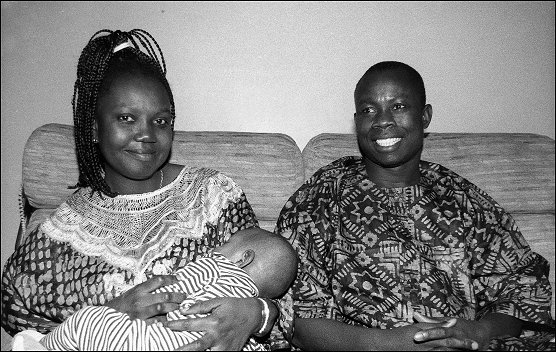Stella and Abraham

Photograph, John Owens.
Abraham: We come from Nigeria in West Africa and we are part of the Yoruba tribe from the south-west part of the country. We decided to leave Nigeria because we wanted to experience another country, have a change of environment and earn our living elsewhere. My older brother, who was living in Australia, sponsored us to come.
Stella: We chose Australia because it is quiet and crime in not as common as in the USA where nearly everyone owns a gun. We thought it would be a better place to settle and raise children.
We had studied geography at school and knew about the Australian climate and that Australia was the largest island in the world with lots of kangaroos!
Abraham: I had some CDs with photographs of different countries and before we came I studied pictures of Sydney Harbour and the Shrine of Remembrance in Melbourne.
When we arrived in Sydney in May 1998 we found the airport staff very friendly and helpful. Even though we saw no black people on the aeroplane we found people here were happy to see us. This gave us a good impression of the country and we were very pleased not to be left stranded and disappointed on our first day.
In Nigeria I worked as an electronics engineer but as a migrant in Australia it was not very easy to find a job in my profession. I received many ‘sorry’ letters and I sometimes I like to place them in a big pile as reminder of my difficulties. I think organisations did not trust my qualifications and wrongly assumed that I didn’t know the current technology because I came from a third world country. Sometimes I think I was disqualified because of my accent - although nobody said that directly. After I did a six months bridging course at RMIT I found a job at Telstra and I count myself very fortunate.
Stella: I am qualified as a lab technician but have been unable to get a job and I now work in a nursing home.
In Nigeria we grew up learning British English and it was difficult to get used to some of the idiomatic expressions and slang used in Australia such as ‘okey, dokey’ and ‘rightio’. We speak the same English as Australians but we pronounce words differently and it was difficult for us to understand and be understood. Some people became embarrassed but we took this as a challenge.
Abraham: We find the culture in Melbourne very ‘white’. People are private and the level of interaction is low. In my country your door is always open to your neighbour and people will come into your home if you need help. When we moved here I only saw my neighbours when I peeped through the window.
We were fortunate to be able to stay with my brother when we first arrived in Australia but when we moved to Clayton South, and I was at work, Stella was lonely at home.
Stella: When we first arrived here we had no friends. We didn’t know our neighbours and we just sat at home. I slept, woke, looked at the TV and then went to sleep again. Even before Abraham arrived home from work I was waiting at the door because I was so alone. These things are getting easier now, though.
I still miss our local food such as yam, roasted maize and smoked fish. We are not used to vegetables like broccoli and we are also not used to chemicals and preservatives in Australian food.
Abraham: I am currently the secretary of the Yoruba Association of Victoria. We like to contribute to the social economy of Victoria and we hold a festival every January where we wear our traditional costumes, cook traditional foods and display our cherished culture to the wider community. We also assist new Yoruban arrivals to settle in Australia. We teach our children to speak Yoruba language and teach them that although they were born in another land they have a Yoruban culture.
